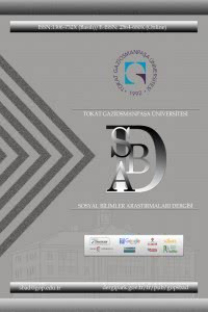NLP İlkelerinin Öğrenci Algısına ve Başarısına Etkisi
Araştırmanın amacı, NLP(Neuro-Linguistic Programming) ilkelerinin öğrenci algısına ve başarısına etkisini belirlemektir. Araştırmada, ağırlıklı olarak nitel deney araştırma yöntemi kullanılmıştır. Bu amaçla, Fırat Üniversitesi Eğitim Fakültesi Sosyal Bilgiler Öğretmenliği Bölümünde, 2005-2006 öğretim döneminde “Öğretmenlik Mesleğine Giriş” ve “Gelişim ve Öğrenme” derslerini alan öğrenciler için ayrı ayrı deney ve kontrol grubu oluşturulmuştur. Öğrencilerin birinci ve ikinci ara sınav notları göz önüne alınarak kümeleme (cluster) analizi yapılmış ve “Öğretmenlik Mesleğine Giriş” dersi için deney ve kontrol grubuna 38’er öğrenci seçilmiştir. “Gelişim ve Öğrenme” dersi için de deney ve kontrol grubuna 28’er öğrenci seçilmiştir. Deney gruplarındaki öğrencilere ikişer saatlik iki hafta NLP ilkeleri anlatılmıştır. Bu anlatımda, NLP’nin ne olduğu, NLP’nin insanları nasıl etkilediği ve özellikle ilkeleri örneklerle sunulmuştur. Kontrol gruplarına ise, NLP ilkelerinin anlatımı yapılmamıştır. Araştırma verileri, 8 açık uçlu soru ile toplanmış olup basit içerik analizi ile çözümleme yapılmıştır. Ayrıca, başarı notları karşılaştırılmıştır. Araştırma sonucunda öğrencilerin NLP ilkelerini oluşturan kavramlardan “başarı” ve “iyi niyet” kavramlarını kullandıkları gözlenmiştir. Ayrıca, bu anlatımın “Öğretmenlik Mesleğine Giriş” dersinde %7.4 ve “Gelişim ve Öğrenme” dersinde %5.47’lik başarı artışı sağladığı söylenebilir. Bu bulgulara göre sınıflarda NLP ilkelerinin uygulanmasında yarar vardır. Bunu sağlamak için NLP uzmanlarıyla işbirliği içersinde, öğretmenlerin NLP konusunda eğitilmeleri sağlanmalıdır
The Effect of NLP Principles towards Student Perception and Achievement
The aim of the research is to determine the effect of NLP (Neuro-Linguistic Programming) seminar towards students’ perception and achievement. In this research, mostly qualitative experiment research method was used.With this case, in the department of Social Sciences Teaching, in the Faculty of Education, at Fırat University, two different experimental and control groups were chosen that have taken the courses of Introduction To Teaching Profession and Development and Learning. In consideration of the students’ first and second mid-term grades, cluster analysis was done, and for each group, both for the experimental and control, 38 students were chosen for the course of Introduction to Teaching Profession and 28 were for the course of Development and Learning. In this case, two hours of NLP seminar was given to the students in the experimental group. Through the content of the seminar such topics like, what NLP is, its principles and how NLP affects people was explained with examples. To the control group, no explanation about NLP was given. The research data was collected with 8 open-ended questions and the data was analyzed with the simple content analysis. At the end of the research, it was observed that students used the concept of achievement and good intention among NLP principles. Furthermore, it can also be said that NLP seminar has increased an achievement of 7.4 % in the course of Introduction to Teaching Profession and %5.47 in the course of Development and Learning. According to these findings, it is helpful to practice NLP principles in classrooms. And to supply this, teachers need to be educated on the subject of NLP with the help and cooperation of the experts.
Keywords:
NLP, perception, achievement,
___
- Akgündüz, A. (2002). NLP İle Mükemmel Olmanın Sırları, Eğitim Bilim, Aylık Eğitim Bilim ve Kültür Dergisi, Mart, 5(42), 14-17.
- Alder, H. (2002). Handbook of NLP : A Manual for Professional Communicators. Abingdon, Oxon, , GBR: Gower Publishing Limited.
- Biçer, T. (1999). NLP Kişisel Liderlik, İstanbul: Beyaz Yayınları.
- Blackerby, D. A. (2002 b). Using Neuro-Linguistic Programming (NLP) in the Classroom, 10/12/2002’de indirildi. web adresinden
- Demir, S. ve Bingül, H. (2007). İlköğretim öğrence ve velilerinin nörolinguistik programlamanın (NLP) sınıf içinde uygulamalarına ilişkin görüşler, Elektronik Sosyal Bilimler Dergisi, 6(19), 224-232.
- Mayring, P. (1996). Einführung in die qualitative Sozialforschung. (Çev. A.Gümüş ve M.S. Durgun) Psychologie Verlag Union München, Weinheim.
- McDermott, I. And Jago, W. (2001). Brief NLP Therapy, London, Thousand Oaks, New Delhi: SAGE Publications.
- Miles, M. and Huberman, M. (1994). An expanded sourcebook qualitative data analysis (Second edition). California: Sage Publications.
- Mills, H. (2001). Team-Based Learning. USA: Gower Publishing Limited.
- O’Connor, J. And McDermott, I. (2001). NLP’nin İlkeleri, (Çeviri: Demet Uyar Ezerler), İstanbul: Sistem Yayıncılık.
- Öner, M.(2002). NLP, Eğitim Bilim, Aylık Eğitim Bilim ve Kültür Dergisi, Mart, 5(42), 7- 8.
- Prior, R. and O’Connor, J. (2000). NLP ve Karşı Cinsle İlişkiler (NLP & Relationships), (Çeviri: Selim Yeniçeri), İstanbul: Beyaz Yayınları.
- Robbins, A. (1992). Sınırsız Güç. (Çeviri: Dr. Mehmet Değirmenci), İstanbul: İnkılap Kitapevi.
- Saygın, O. (2000).Negatif Limanlardan Pozitif Sulara, İstanbul: Hayat Yayıncılık.
- Saygın, O. (2002). NLP İle Yepyeni Bir Dünya… Eğitim Bilim, Aylık Eğitim Bilim ve Kültür Dergisi, Mart, 5(42), 9-10.
- Semerci, Ç. (2003). NLP’nin Sınıfta Uygulanabilirliği. XII. Eğitim Bilimleri Kongresi (15- 18 Ekim 2003). Gazi Üniversitesi, Eğitim Bilimleri Enstitüsü, Ankara.
- Yıldırım, A. ve Şimşek, H. (2000). Sosyal Bilimlerde Nitel Araştırma Yöntemleri. 2. Baskı. Ankara: Seçkin Yayıncılık.
- ISSN: 1306-732X
- Yayın Aralığı: Yılda 2 Sayı
- Başlangıç: 2006
- Yayıncı: Gaziosmanpaşa Üniversitesi Sosyal Bilimler Enstitüsü
Sayıdaki Diğer Makaleler
İnternete Dayalı Araştırmalarda Eleştirel Düşünme Sorunsalı: 21. Yüzyıl Skolastiğine Doğru
Okul Kültürü İle Öğrencilerin Şiddete Başvurma Davranışları Arasındaki İlişkiler
Küreselleşmenin Sivil Toplum Siyaseti
Nazan ARSLANER, Berkan HAMDEMİR
Kültürler Arası Farkındalık Yaratmak İçin E-Postayla İletişim
Sanal Platformların Lisansüstü Eğitimde Kullanımı: Türkiye Perspektifi
Kerem KILIÇER, Ahmet Naci ÇOKLAR
Bilim ve Sanat Merkezlerinde (BİLSEM) Görev Yapan Öğretmenlerin BİLSEM’e Yönelik Görüşleri
NLP İlkelerinin Öğrenci Algısına ve Başarısına Etkisi
Mehmet TAŞPINAR, Nuriye SEMERCİ, Çetin SEMERCİ, Kaan GÜNEY
